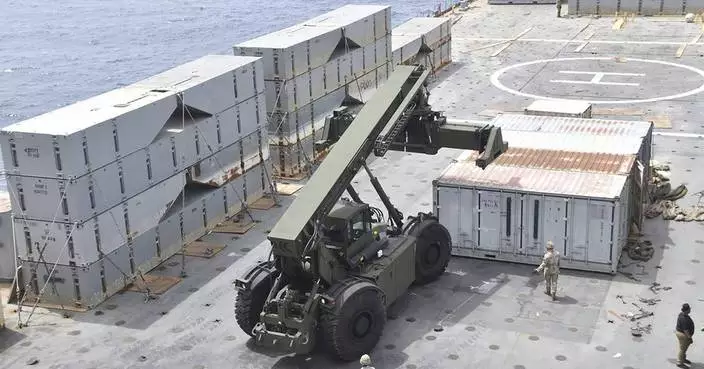The Supreme Court on Tuesday threw out a nearly $315 million judgment against Sudan stemming from the USS Cole bombing, saying Sudan hadn't properly been notified of the lawsuit.
The justices ruled 8-1 that notice of the lawsuit should have been mailed to Sudan's foreign ministry in the country's capital, Khartoum. The notice was instead mailed to Sudan's embassy in Washington.
The lawsuit the justices ruled in involves sailors who were injured in the 2000 bombing of the Cole in Yemen. Sailors and their spouses sued Sudan in a U.S. court, arguing that Sudan had provided support to al-Qaida, which claimed responsibility for the Cole attack. A total of 17 sailors died when the ship was struck by a bomb-laden boat. Dozens of others were injured.
In order to alert Sudan to the lawsuit, the group mailed the required notice to Sudan's embassy in Washington. Sudan didn't initially respond to the lawsuit in court, and a judge entered an approximately $315 million judgment against the country. Sudan then tried to get the judgment thrown out.
Sudan and the sailors who were suing disagreed about the requirements of a 1976 law, the Foreign Sovereign Immunities Act. The statute lays out how to properly notify another country of a lawsuit filed in a U.S. court. If other agreements between the countries don't exist, the law says that notice should be "addressed and dispatched ... to the head of the ministry of foreign affairs of the foreign state concerned."
Lawyers for Sudan and for the U.S. government had argued that the best reading of that phrase is that it requires the notice to be sent to the foreign minister in the foreign country. The Supreme Court agreed.
Justice Samuel Alito, writing for the majority , noted that the ruling is "not the end of the road" for the injured sailors and their spouses who sued. They can try re-sending notice of the lawsuit, this time to Sudan's foreign ministry in Khartoum. If that fails, they have yet another option, sending it through diplomatic channels.
Justice Clarence Thomas dissented, saying he believed the sailors complied with the Foreign Sovereign Immunities Act by sending notice of the lawsuit to the embassy.
The court's decision is also relevant to a second case filed over the USS Cole bombing, one filed by family members of the 17 sailors who died in the attack. In that case, notice of the lawsuit was also sent to Sudan's embassy. An appeals court threw out a $34 million judgment as a result.
Beyond the current case, the high court's decision will most directly impact victims of terrorist attacks abroad who want to use U.S. courts to sue foreign countries that allegedly provided support for those attacks.
The case is 16-1094, Republic of Sudan v. Harrison.
Follow Jessica Gresko on Twitter at http://twitter.com/jessicagresko
UNITED NATIONS (AP) — Russia has circulated a U.N. resolution calling on all countries to take urgent action to prevent putting weapons in outer space “for all time” a week after it vetoed a U.S.-Japan resolution to stop an arms race in space.
The Russian draft resolution, obtained Wednesday by The Associated Press, goes further than the U.S.-Japan proposal, not only calling for efforts to stop weapons from being deployed in outer space but for preventing “the threat or use of force in outer space,” also “for all time.”
It says this should include deploying weapons “from space against Earth, and from Earth against objects in outer space.”
Russia’s U.N. Ambassador Vassily Nebenzia told the Security Council when he vetoed the U,S.-Japan draft that it didn’t go far enough in banning all types of weapons in space.
The vetoed resolution focused solely on weapons of mass destruction including nuclear arms, and made no mention of other weapons in space.
It would have called on all countries not to develop or deploy nuclear arms or other weapons of mass destruction in space, as banned under a 1967 international treaty that the U.S. and Russia ratified, and to agree to the need to verify compliance.
Before the U.S.-Japan resolution was put to a vote on April 24, Russia and China proposed an amendment that would call on all countries, especially those with space capabilities, “to prevent for all time the placement of weapons in outer space, and the threat of use of force in outer spaces.”
The vote was 7 countries in favor, 7 against, and one abstention and the amendment was defeated because it failed to get the minimum 9 “yes” votes in the 15-member Security Council required for adoption.
U.S. Ambassador Linda Thomas-Greenfield told the council after the vote that Russian President Vladimir Putin has said Moscow has no intention of deploying nuclear weapons in space.
“Today’s veto begs the question: Why? Why, if you are following the rules, would you not support a resolution that reaffirms them? What could you possibly be hiding,” she asked. “It’s baffling. And it’s a shame.”
Putin was responding to White House confirmation in February that Russia has obtained a “troubling” anti-satellite weapon capability, although such a weapon is not operational yet.
Russia’s U.N. Ambassador Vassily Nebenzia said after casting the veto that the U.S.-Japan resolution cherry picked weapons of mass destruction.
He said much of the U.S. and Japan’s actions become clear “if we recall that the U.S. and their allies announced some time ago plans to place weapons … in outer space.”
Nebenzia also accused the U.S. of blocking a Russian-Chinese proposal since 2008 for a treaty against putting weapons in outer space.
Thomas-Greenfield accused Russia of undermining global treaties to prevent the spread of nuclear weapons, irresponsibly invoking “dangerous nuclear rhetoric,” walking away from several of its arms control obligations, and refusing to engage “in substantive discussions around arms control or risk reduction.”
Much of the Russian draft resolution is exactly the same as the U.S.-Japan draft, including the language on preventing an arms race in space.
It calls on all countries, especially those with major space capabilities, “to contribute actively to the objective of the peaceful use of outer space and of the prevention of an arms race in outer space.”
Thomas-Greenfield said the world is just beginning to understand “the catastrophic ramifications of a nuclear explosion in space.”

FILE - U.S. Ambassador to United Nations Linda Thomas-Greenfield speaks on Thursday, April 18, 2024, in Tokyo. The U.N. Security Council is set to vote Wednesday, April 24, 2024, on a resolution announced by Thomas-Greenfield, calling on all nations to prevent a dangerous nuclear arms race in outer space. It is likely to be vetoed by Russia. (AP Photo/Eugene Hoshiko, Pool, File)










